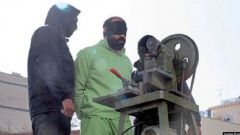Human Rights Voices
While the UN devotes its human rights operations to the demonization of the democratic state of Israel above all others and condemns the United States more often than the vast majority of non-democracies around the world, the voices of real victims around the world must be heard.
Iran, October 24, 2019
A Thief’s Hand Is Amputated In Iran As Islamic Punishment
Original source
The authorities in the province of Mazandaran, northern Iran, have amputated the hand of a man charged with theft, the public relations bureau of the local Justice Department announced on Wednesday, October 23.
The unnamed man has confessed to 28 cases of robbery from homes, and he was punished according to Islamic Law, said the local Justice Department in a statement.
"The policy of Mazandaran's Justice Department is severee and indiscriminate punishment for people who disrupt public security and order", a state-run news agency, Young Journalists Club (YJC) cited the statement as saying.
However, the Iran Human Rights Organization based in Norway notes that punishment by amputation is a blatant violation of human rights and a manifestation of torture.
Amnesty International (AI) says, "Amputation is torture plain and simple, and administering torture is a crime under international law. As a party to the International Covenant on Civil and Political Rights, Iran is legally obliged to forbid torture in all circumstances and without exception. Those responsible for ordering and executing such practices should know that they are liable to criminal prosecution under international law."
Meanwhile, several legislators and government officials in Iran have also protested harsh punishments such as amputation.
Referring to chopping off the hand of a thief in Iran's second-largest city, Mashhad, a member of the board of directors of parliament's Judicial Commission, Yahya Kamalpour, said two years ago that the judge who issued the verdict against the suspect, could have decided otherwise by considering the hardship the convict was struggling with.
""We are witnessing embezzlement of billions, cronyism, benefiting from economic corruption, and much more serious crimes across the country," Kamalpour asserted.
Nonetheless, The Islamic Republic authorities have consistently defended amputation as the best way to deter theft, expressing regret that it cannot be practiced in public and on a widespread basis without international condemnation, Iran Human Rights Monitor (IHRM) reported on Thursday, October 24.
Under Article 201 of Iran's Islamic Penal Code, the following punishments can be carried out for theft:
(a) On the first occasion, amputation of the full length of four fingers of the right hand of the thief in such a manner that the thumb and palm of the hand remain.
(b) On the second occasion, amputation of [part of] the left foot...
(c) On the third occasion, life imprisonment.
(d) On the fourth occasion, the death penalty even though the theft is committed in prison.
However, amputation as a legal punishment violates Article 7 of the International Convention on Civil and Political Rights (ICCPR), which prohibits subjecting people "to torture or cruel, inhumane or degrading treatment or punishment."
The last time a hand amputation verdict was carried out in Iran was in January 2018 when a 34-year-old man who was also convicted of theft, had his hand cut off. The amputation, which was conducted by guillotine, took place in the central prison in Mashhad. The man was sentenced to hand amputation six years earlier for stealing livestock and other valuables from several villages in the region.
In May, there were reports that 23 prisoners convicted of theft were waiting for their hand amputation sentences to be carried out in the Greater Tehran Prison.
According to human rights sources, between 2007 and 2017, the Iranian authorities issued at least 215 amputation sentences and carried out 125 amputations, including at least six amputations in public, IHRM reports.

